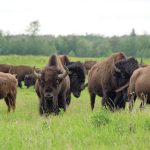It’s five o’clock on a summer morning in Winnipeg. Our research team is unloading a series of small traps from the trunk of our car, which is parked on a residential road. Using a stick, we slather peanut butter from a huge jar into each trap as bait and quietly sneak into the yards we’ve











